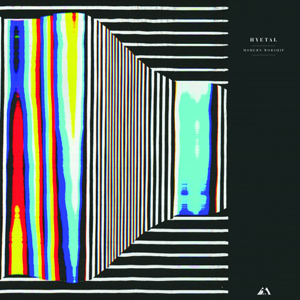Hyetal Modern Worship
Broadcast, the debut album from Bristol’s David Corney (a.k.a Hyetal), linked its producer to a […]

Broadcast, the debut album from Bristol’s David Corney (a.k.a Hyetal), linked its producer to a specific sound, a template which has stuck with him for better or worse. It was effectively an extension of the ideas that Corney brought together on his excellent 2010 single “Phoenix,” an amalgamation of bombastic ’80s drums and John Carpenter synths as filtered through shoegazey song structures and a production style indebted to the purple sounds of his town’s dubstep community. While this nostalgic sound palette was hardly unique, Corney managed to pull it off with a level of conviction and songwriting prowess that set him apart from the bulk of his retro-inclined peers. Broadcast did, however, seem like it was a little too attached to this core formula—sometimes sounding more like variations on a theme rather than a full-fleged LP. It’s pleasing, then, that Hyetal’s second album finds him pushing those ideas a bit further whilst remaining rooted to the winning aesthetic of his debut.
With its rapid-fire synth riff and dreamy lead, opener “Forefathers” is a more familiar sounding track on Modern Worship. There’s a slight aggressive undertone to its percussion parts, however, which is indicative of one of the most noticeable differences between Hyetal’s two albums. While the beats are mostly built from the same vintage drum sounds pillaged for Broadcast, the producer uses them in a rougher way here. His previous LP was built on pristinely polished drum hits, but this time, things feel slightly more loose—the results tend to push a vibe similar to classic New Order rather than, say, Miami Vice.
Despite these subtle changes, though, vintage synth music is still very much Hyetal’s driving influence on Modern Worship. While minor deviations sneak their way into the tracklist—”Moving Statues” opens with a hip-hop-slanted 808 workout and “1000 Lights” harkens back to Corney’s early dubstep experiments—everything here is led by rich and melodic synths reminiscent of soundtrack pioneers like Vangelis and Jan Hammer. The slightly loose and more spacious instrumentals provide the album with some highlights. “Cloud Bridge” and the aforementioned “Moving Statues,” for example, both have a live feel to them—as if they were jammed out with sequencers and drum machines on the spot—and sound all the more engaging as a result.
It’s Modern Worship‘s five vocal tracks, however, that exhibit the most progression. Three of those tunes find Corney working with UK singer/songwriter Gwilym Gold, a collaboration which results in some of the LP’s strongest moments. Lead single “Northwest Passage” follows the synth-led formula used on many of the instrumental tunes, but Gold’s vocal presence gives Corney a central focus to work around. The singing allows him room to shift into a more traditional pop territory, which Hyetal moves into assuredly. “Left” and album closer “Four Walls” are even more fantastic, as they find the artist deconstructing his template around Gold’s lyrical contributions—making for more minimal and airy productions. Each cut strips down most of the drums and allows the singing to take center stage. As a result, we’re presented with a welcome fresh perspective on Hyetal’s propulsive, neon-hued arrangements. Broadcast contributor Alison Garner also appears on “The City is Ours” and “1000 Lights,” and provides a breathy, energetic counterpart to the music’s relative grittiness—effectively emphasizing just how naturally Garner’s voice works with Hyetal.
While Modern Worship is hardly a reinvention for its Bristolian creator, it’s undoubtedly a step forward—and one in the right direction, for that matter. There was a lot to like—even love—about Corney’s debut LP, and thankfully, much of that is still evident here. But this album feels broader and more adventurous; it avoids getting stuck in the same corner that Broadcast clung to. Truthfully, there’s no singular tune from Modern Worship that stands out in the same unforgettable way that “Phoenix” did, but as a long-form piece, Hyetal’s sophomore full-length is the most satisfying work he’s released so far.

